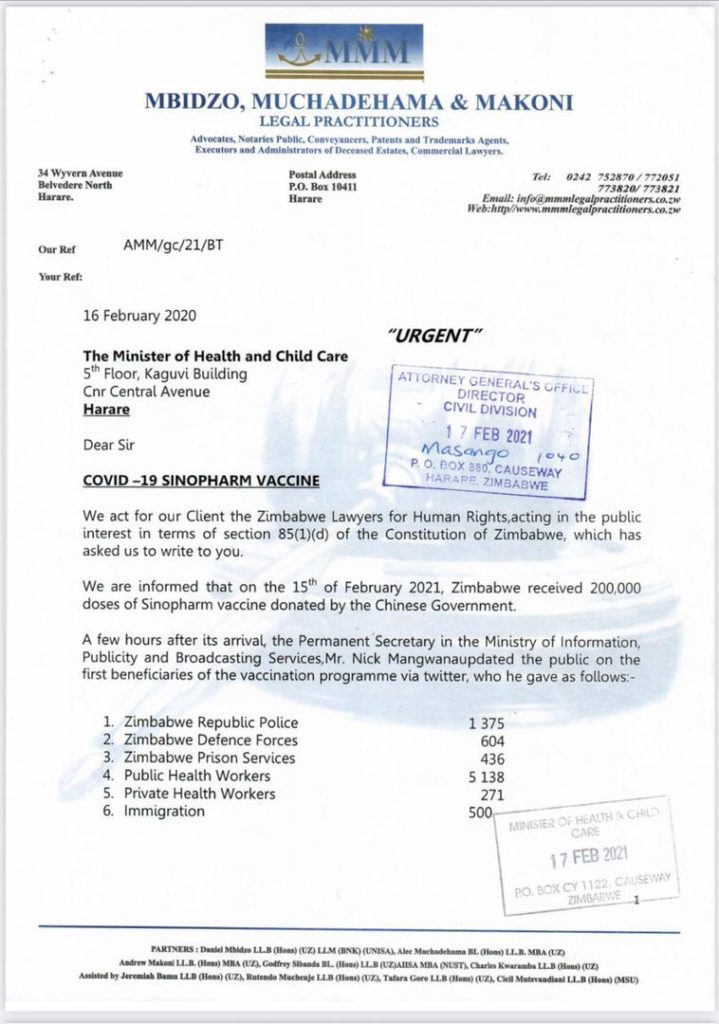Despite concerns that Zimbabwe’s government is rolling out the Chinese made – Sinopharm vaccine – before clinical trials have been conducted locally to establish its safety and efficacy to the populace, the first phase of the vaccination program started this Thursday at Wilkins Infectious Diseases Hospital in Harare.
The first phase is targetting frontline workers in the health, security and immigration departments.
Vice President, Constantino Chiwenga, also the Health and Child Care minister, is the first government official who volunteered to be vaccinated alongside health workers.
200 000 doses of the Chinese made Sinopharm vaccine arrived Monday and an additional 600 000 doses secured through direct purchase will arrive in March.
When the Sinopharm vaccine arrived in the country, Head of Zimbabwe’s Vaccination Programme, Dr Robert Mudyiradima, said the government would be conducting clinical trials to verify whether it would work, as when it was manufactured it was not tested against the variant coming out of South Africa.
But people have questioned why Sinopharm was approved for use in Zimbabwe when the country’s Covid-19 cases are now fuelled by the Covid-19 variant – 501Y.V2 – first discovered in South Africa and secondly when there were no local clinical trial phases.
Zimbabwe’s information minister, Monica Mutsvangwa, announced this week that 501Y.V2 now makes up 60 percent of the positive cases recorded in the country, as genomic sequencing results conducted recently indicated that the type of Covid-19 virus the country had in 2020 has receded.
The government insists Sinopharm was approved for use by the public in China and is used in other countries including the United Arab Emirates, Brazil, Argentina, Morocco, Chile, Indonesia and Egypt while the efficacy rate against Covid-19 range from 76 to 86 percent.
According to the Centres for Disease Control and Prevention (CDC), clinical development is a three-phase process.
During phase one, small groups of people receive the trail vaccine.
In phase two the clinical study is expanded and vaccines are given to people who have characteristics (such as age and physical health) similar to those whom the new vaccine is intended for.
In Phase three the vaccine is given to thousands of people and tested for efficacy and safety.
Without the clinical phases in Zimbabwe, some claim the government is using people as “guinea pigs” and asked whether these Sinopharm vaccine recipients are participating in a clinical trial, if any at all.
For answers, the Zimbabwe Lawyers for Human Rights (ZLHR) wrote to the Ministry of Health and Child Care and threatened to approach the courts if no response came by 4pm of February 19, 2021.

Through Mbidzo, Muchadehama and Makoni Legal Practitioners, ZLHR, expressed concern over the government’s decision to vaccinate people before rolling out clinical trials.
“It is therefore our clients view that clinical trials precede the rolling out of the vaccination programme, the aim being to establish whether the vaccination drug undergoing trials is safe to administer and will not have adverse side effects,” ZLHR said.
“Clinical trials cannot be conducted simultaneously with the actual vaccination of the population as the acting health secretary appears to suggest. If that happens many lives would be put to risk as they may be victims to irreversible side effects. Reports from other countries where this vaccine has been tested appear to confirm the possibility of such side effects.”
ZLHR said were the clinical trials to be conducted, the government must take note of Section 52 (c) of Zimbabwe’s constitution relating to bodily and psychological integrity, which includes the right not to be subjected to medical or scientific experiments.
“Our client therefore demands an assurance that clinical trials of the Sinopharm vaccine and any future Covid-19 vaccines to be imported, whose results will be made public will be conducted first and the safety and efficacy of the vaccines established before the population or any select group is vaccinated,” said ZLHR.
Speaking in Parliament Tuesday, Chiwenga defended the government’s decision to use Sinopharm claiming the vaccine was “approved by the World Health Organisation (WHO)and it was attenuated and that is why we chose it. My deputy is the one who went to get the delivery and we are also taking Sinovac because it was approved by WHO,” he said.

